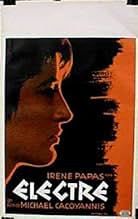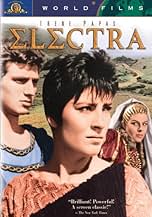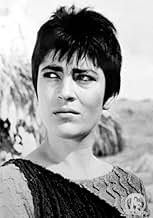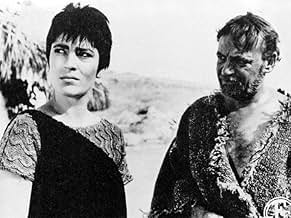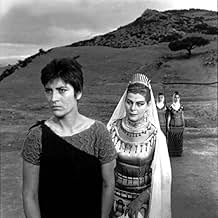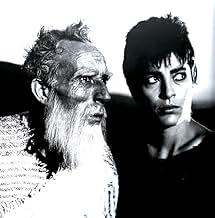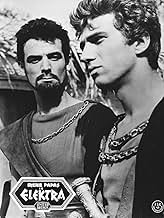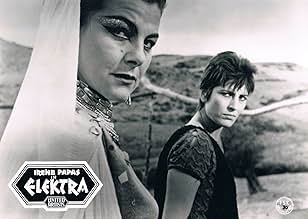AVALIAÇÃO DA IMDb
7,6/10
2 mil
SUA AVALIAÇÃO
Vivendo no exílio após a morte do seu pai, os filhos adultos de um rei assassinado e usurpado convergem para uma vingança.Vivendo no exílio após a morte do seu pai, os filhos adultos de um rei assassinado e usurpado convergem para uma vingança.Vivendo no exílio após a morte do seu pai, os filhos adultos de um rei assassinado e usurpado convergem para uma vingança.
- Direção
- Roteiristas
- Artistas
- Indicado a 1 Oscar
- 11 vitórias e 2 indicações no total
Fivos Razi
- Aegisthus
- (as Phoebus Rhazis)
- Direção
- Roteiristas
- Elenco e equipe completos
- Produção, bilheteria e muito mais no IMDbPro
Avaliações em destaque
Slow. Deliberate. Engaging. Mesmerizing. Poetic.
The real star of the show is the exterior shots. The acting, especially by Papas, is deservedly acclaimed. The music score is sumptuous. The minimal dialogue serves to heighten the film-watching experience. But what strikes me dumbfounded is the amazing blocking of the actors...most assuredly by the director...as it mimics true choreography.
One imdB reviewer labels this film a "snorefest". I can understand that opinion if you require something action-oriented. This film is purely cerebral, so don't expect something beyond that.
Oddly enough, my cable provider classifies this film as AO--Adults Only. That rating, also known as NC-17, is reserved for sexual content deemed too explicit to warrant an R rating. Be assured there's absolutely and assuredly nothing explicit about this film. No sex. All violence is implied.
Recommended for cinema junkies.
The real star of the show is the exterior shots. The acting, especially by Papas, is deservedly acclaimed. The music score is sumptuous. The minimal dialogue serves to heighten the film-watching experience. But what strikes me dumbfounded is the amazing blocking of the actors...most assuredly by the director...as it mimics true choreography.
One imdB reviewer labels this film a "snorefest". I can understand that opinion if you require something action-oriented. This film is purely cerebral, so don't expect something beyond that.
Oddly enough, my cable provider classifies this film as AO--Adults Only. That rating, also known as NC-17, is reserved for sexual content deemed too explicit to warrant an R rating. Be assured there's absolutely and assuredly nothing explicit about this film. No sex. All violence is implied.
Recommended for cinema junkies.
From the first moment I saw the movie I rejoiced every bit of it : the crisp splendid black-and-white photography introducing an overwhelmingly barren landscape interacting with the drama we all know to come, the haunting "ancestral" score by Theodorakis, the impact of all sounds, the use of the choir with its laments and warnings and commentaries on everything and everybody, the tensions between good and evil mixed with love and hate, the unavoidable fate of the protagonists who cannot escape destiny as prescribed by bloodline and gods.
Besides being moved by too many unforgettable scenes enforced by splendid suggestive cutting (the actual murders, Electra's cutting her hair for the revenge to come, the confrontations between mother and daughter or brother and sister expressing their antagonistic emotions), the ultimate brilliance this masterpiece is Irene Papas outcry of grief and distress, the camera turning on itself as taking literally heaven and earth as her witness.
Appealing as strong to me as E. Munch's cry or Picasso's Guernica, I visited Mycene much later and still felt the movie's impact discovering this cursed place through Cacoyannis' lens.
Besides being moved by too many unforgettable scenes enforced by splendid suggestive cutting (the actual murders, Electra's cutting her hair for the revenge to come, the confrontations between mother and daughter or brother and sister expressing their antagonistic emotions), the ultimate brilliance this masterpiece is Irene Papas outcry of grief and distress, the camera turning on itself as taking literally heaven and earth as her witness.
Appealing as strong to me as E. Munch's cry or Picasso's Guernica, I visited Mycene much later and still felt the movie's impact discovering this cursed place through Cacoyannis' lens.
As an adaptation of a two thousand year old Greek tragedy, Michael Cacoyannis' "Electra" is hard to beat, and I cannot imagine it being improved upon by any further attempt on it now: there is a stripped down starkness and simplicity to it that benefits it greatly, and lends it the haunting quality of myth that no amount of CGI could better.
It has immaculately brooding, glowing cinematography, unsurpassably shot amid the ancient stones of Mycenae itself, and the music by Mikis Theodorakis (of Zorba The Greek fame) is timeless and perfect.
If I had to point out any weaknesses at all, perhaps Irene Papas in the title role looks a little too 60s in her look, although her acting is fine. There's a couple of gaps in the narrative that should probably have been filmed and inserted, as their absence either weakens the drama or feels confusing. But these are small quibbles.
Several times while watching I found myself thinking it would make a good double bill with Orson Welles' Othello, as it feels cut from a similar cloth, though it is a better film for being less wordy. Recommended.
It has immaculately brooding, glowing cinematography, unsurpassably shot amid the ancient stones of Mycenae itself, and the music by Mikis Theodorakis (of Zorba The Greek fame) is timeless and perfect.
If I had to point out any weaknesses at all, perhaps Irene Papas in the title role looks a little too 60s in her look, although her acting is fine. There's a couple of gaps in the narrative that should probably have been filmed and inserted, as their absence either weakens the drama or feels confusing. But these are small quibbles.
Several times while watching I found myself thinking it would make a good double bill with Orson Welles' Othello, as it feels cut from a similar cloth, though it is a better film for being less wordy. Recommended.
Euripides is the most 'modern' of the ancient dramatists in terms of his psychological penetration and the motives of his characters. This makes his plays ideally suited to the medium of film. Michael Cacoyannis set about the task of filming an Euripidean trilogy of 'Electra', 'The Trojan Women' and 'Iphigenia' of which 'Electra' is arguably the best. The score of Theodorakis, cinematography of Walter Lassally and a fabulous cast headed by Irene Papas as Electra, Yannis Fertis as Orestes, Aleka Katselli as Clytemnestra and Manos Katrakis as the Tutor all contribute to a stunning and mesmerising filmic experience. Cacoyannis, Lassally and Papas would go on to make 'Zorba the Greek' and Papas would play Helen and Clytemnestra for the same director.
Euripides wrote 'Electra' in about 420 bc and like those other masterpieces of the human mind 'Hamlet' and 'Phaedra', it is for all the ages. Let us be grateful to Cacoyannis for having given us this splendid version. Top marks.
Euripides wrote 'Electra' in about 420 bc and like those other masterpieces of the human mind 'Hamlet' and 'Phaedra', it is for all the ages. Let us be grateful to Cacoyannis for having given us this splendid version. Top marks.
An extraordinary film from a visual and dramatic standpoint, _Elektra_ unfortunately too often plays like a _Cliff's Notes_ version of Euripedes' work (although, in all fairness, I must note that the film is only "based on" the classical play). The essential structure is there: Agamemnon's murder, the banishment of Orestes, Elektra's marriage, the reuniting of the grown children, the double murder. But by clipping away much of the Euripedean dialogue, much depth of characterization is lost. The principles become one-dimensional, with only hints of the complexity which makes the story so overwhelming. However, the stark cinematography and fine acting make this film eminently watchable, particularly at the climatic matricide sequence.
Você sabia?
- CuriosidadesFilmed on location in Mycenae and Argos in 1961.
- Erros de gravaçãoHaving seconds thought about killing Klytaemnistra, Orestis proclaims a devil, not a god, must have spoken to the oracle who told him to seek vengeance. As it happens, the word "devil" comes from the Greek word diábolos which means slanderer or accuser, not the Christian or Islamic word for a supernatural enemy of humankind tempting people to commit evil deeds.
- Citações
Chorus Leader: My child, you must talk to the gods. They will hear you.
Elektra: No god hears me. No human being is listening to my prayers.
- ConexõesFeatured in Storgi sto lao (2013)
Principais escolhas
Faça login para avaliar e ver a lista de recomendações personalizadas
- How long is Electra?Fornecido pela Alexa
Detalhes
- Tempo de duração
- 1 h 50 min(110 min)
- Cor
- Mixagem de som
Contribua para esta página
Sugerir uma alteração ou adicionar conteúdo ausente

